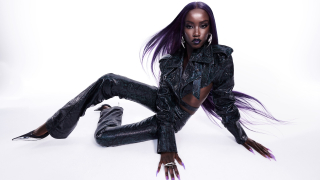Joseph and Ibi Zoboi’s courtship didn’t include romantic dinners, long flirty interactions, hand holding, kissing, or even much talking for that matter. “Usually there is an exchange of numbers, you call and then you go out. That’s what I understood it to be, but Joseph was different,” says Ibi, who worked alongside Joseph, at the time an art educator and set designer at the Girls & Boys Harbor in East Harlem in September of 2000. “It felt like someone who had a crush on you, but couldn’t approach you. We never kissed or even talked on the phone before he proposed,” she explains.
The pair didn’t engage in the traditional dating and intimacy dance. Instead, a few pivotal moments and exchanges would surprisingly be the catalyst for their ongoing 12-year marriage.
Like the one time, for example, Joseph asked Ibi to join him on a walk. “She had no idea where we were going, but she just went along with me,” recalls Joseph. He took her from Harlem all the way to downtown Brooklyn. “In my mind, her sharing that experience with me was a symbolic metaphor for marriage and life. Not everyone can make that journey with you, and she never complained.”
Although they barely spoke on their promenade through the two boroughs, this was the moment the then 30-year-old fell for Ibi. “It wasn’t just about the physical for me. What caught my eye was how she was conscious of African culture and the principles behind it.” Ibi’s Afrocentric aesthetic came to fruition at Hunter College. She went from wearing a perm to growing locks, making her own clothes and becoming a vegetarian immersed in politics and social activism (to the dismay of her conservative mother).
Twenty-three-year-old Ibi was in the midst of ending a two-year relationship, consumed by plans of jump-starting her writing career, and ready to move out of her mother’s house during that faithful walk with Joseph. “I was so distracted at the time, so I wasn’t so focused on him liking me. I do remember shortly after thinking how magical the walk was, and how safe I had felt with him. There was something commanding about his presence; I could really trust him. I never felt this in my previous relationships,” describes Ibi.
The next time they spent time together was when she was going to the movies alone and, unexpectedly, Joseph invited himself. “Again, we talked very little and it was really quiet. There was a deep connection happening that I did not recognize right away. He was much more aware of it,” she admits.
The Haitian-born, New York City-bred writer and educator’s first impressions of Joseph from afar had a hand in her initial hesitance to go there. “I really did not think he was my type. At that time, I was dating an Ivy League graduate poet. Joseph came across as dark and a loner, even though he was always smiling with the kids. He had a long beard, which he braided, and he wore a turban. He looked like a black Samurai carrying around a guitar,” says Ibi in mid-chuckle.
But when their conversations turned to reading (a favorite pastime of Ibi’s), she was instantly drawn to his passion for books and realized her view of him was far from reality. The two quickly started exchanging books. “I loved that he was well read. He read me passages he would highlight. I don’t remember thinking he would be a great boyfriend or husband, just that this was an amazing person,” says Ibi.
When she lent him her favorite book—The Spirit of Intimacy by Sobonfu Somé—the dynamic of their relationship was forever altered. Unlike their previous exchanges, Joseph didn’t share his thoughts on this particular book, which touches upon the power of spirituality in preserving relationships. “I thought he must have not read the book,” Ibi recalls. Little did she know Joseph not only read it but had planned to perform a special ceremony from the book for her.
“One of the things the author suggests to groom and nurture a relationship is to create an ash circle. I felt by Ibi giving me this book, she actually gave me the key on how to create the foundation for a safe and healthy relationship,” says Joseph.
On December 22, 2000, only three months after they first met, Joseph staged the ash circle ritual on the roof of the school. “In the center there was Joseph. He extended his hand and had me cross over to the middle of the circle. He got down on one knee and asked me to be his queen. I was shaking and crying,” says Ibi.
He presented her with a tall metal art piece she admired in a store but decided against purchasing due to its hefty price tag. It depicts three African women wearing three different colors holding up a candle. She felt, without even dating Joseph, that they had known each other their whole lives.
“I did not think this dude was crazy at all. It was very magical,” she says. “From that point on, we did things outside of the confines of this culture,” says Joseph, who introduced Ibi as his wife long before they lawfully tied the knot on September 21, 2001, at a Queens courthouse.
As their relationship matured and they began to unearth the similarities in their multicultural backgrounds and experiences, it became obvious why they were ultimately destined to be together (beyond the mystical force that drew them close). Both their fathers were involved in politics: Ibi’s father in Haiti and Joseph’s in Liberia.
“We both saw our fathers give in to their weaknesses when it came to power,” points out Joseph, who was born in Cleveland, Ohio, and left shortly after to live with his grandparents in Trinidad. At 11, he reunited with his parents in Liberia. At 13, Joseph was back in Trinidad, where he remained until eventually moving to New York.
Ibi never grew up with her dad. “My dad was a wealthy man in Haiti who had women on the side, and my mom had been his mistress,” she shares. “I watched my mom looking for love growing up. She would marry and get divorced, marry and get divorced. That was hard to see.”
Joseph, on the other hand, witnessed his grandparent’s long-lasting relationship, which instilled in him the value of commitment, loyalty and support. In fact, Joseph was so supportive of Ibi’s writing goals, he paid for her to study with the late Octavia Butler in Seattle at the Clarion West Science Fiction & Fantasy Writers’ Workshop.
Upon her return, he presented her with a yellow and white gold ring he designed himself. The Zobois unconventionally grassroots wedding, which took place a year to the day of the ash circle, was a reenactment of the original ash ceremony held where they met, at the school. Ibi designed an off-the-shoulder dress with an Egyptian collar and an African bubu for Joseph. They both cooked the food and Joseph’s art decorated the walls. He sang and she performed a dance. “It was a way to invite everyone into our world and experience our meaning of love,” says Joseph.
They also marked their special occasion as a “coming out ceremony.” “I was letting people know my new name and Joseph was reclaiming his grandfather’s African name, Zoboi,” explains Ibi. While close friends knew her by her Yoruba name, Ibi, her birth name is Pascale Philantrope. “I was learning a lot about Haitian history; my name was unapologetically French and I didn’t feel French. There was this sort of karmic debt we had to clean out with learning what our fathers had to do to keep their power in corrupt countries. We had to subconsciously erase that and not pass it on to our children.”
They’ve taught their daughters—Abadai (10), Bahati (8) and youngest son, Zuberi (6)—to be proud of their multicultural roots. Staying connected to Haiti, Trinidad and Liberia is very important (especially for Ibi, whose mother didn’t embrace her Haitian heritage, spoke to her only in French, and insisted she immerse herself in American culture). Ibi has tackled this topic in her published writing, and founded the Daughters of Anacaona Writing Project, a writing workshop for Haitian teenage girls that works to connect them to their Haitian roots in a “way they may not get to do in school.”
Education extends beyond their chosen professions. Ibi is halfway through earning her Master’s in writing for children, and Joseph just recently completed his Master’s in arts education. “With us being in school and our children seeing us studying and working hard, we are setting an example, and that means everything,” says Joseph. He’s launched the Rising Son Project, a series of arts and leadership workshops for middle school and high school boys from marginalized communities, teaching them everything from architecture and graphic design to woodcarving. The two have also collaborated on an ABC children’s book, A Is For Ayiti, with Ibi writing the text and Joseph illustrating the images.
While they are still self-proclaimed African-centered hippies, they’ve evolved over the years. “We don’t shed society’s norms like we used to,” says Ibi. Gone are the ’locks, and the soy is now replaced with traditional meat-based Caribbean or Liberian dishes. According to Ibi, the most challenging part about marriage is trying to figure out what type of family they want to be. “We learned to find balance by supporting our family and having the duplex house with the nice lawn while still doing what we love, which is educate on a grassroots level. I want to be able to travel all over the world, and we are trying to achieve that,” she says.
“That’s great, but I also want to make sure the lifestyle we cultivate doesn’t come to the detriment of somebody else,” offers Joseph. “I want the nice house, but I don’t want anyone to be displaced for it. I want to travel, but at the same time, I don’t want to just go observe people in other countries without contributing our time there.”
His father has been instrumental in guiding him when it comes to raising his own children. “I look at the choices my dad made, and I would have rather had stayed in Ohio in our single house and not be rich but together as a family,” he says. “I want to put my energy towards maintaining my family [rather] than a job to support a certain lifestyle. I don’t want to have to apologize to my children for not being there.”
The Coolest Black Family in America is an EBONY.com original series: an ongoing look at the intricacies, layers and compelling beauty of African-American family life. Of course, The Coolest Black Family is not one family but many. In fact, we’ve found that there are as many Coolest Black Families as there are versions of cool. Also consider: family doesn’t always mean mother + father + kids. What defines family is connected hearts and supported souls. Ride with us weekly as we crisscross the country in search of kinfolk whose cool is so palpable and real, it comes second only to their love. Think your cool fam qualifies? Email us at [email protected] (with Coolest Black Family in the subject line)!
Alexandra Phanor-Faury is a Haitian-American writer living in Brooklyn, New York with a slight (OK, major) addiction to fashion and pop culture. When she’s not up in the middle of the night filling her online shopping carts and catching up on style blogs, she’s writing about fashion and entertainment for a number of websites and her blog, Fringueuse.












